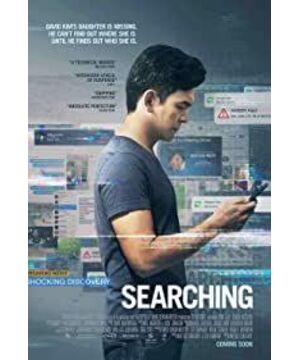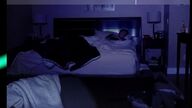Two layers of filters in front of the new "lens"
When "Network Lost" appeared in social network propaganda, its first attraction was the carrier of "screen". Although this is not the first attempt in the film industry, the "screen" format must be the greatest expectation for most audiences who have not known much about this carrier before .
This kind of expectation is not simply curiosity, but is destined to be accompanied by the audience's usual use (ie, "watching") experience of the carrier of "screen" in the Internet age ; at the same time, there is another potential that also plays a role. The viewing experience-the experience of facing the real-life movies shot by most ordinary lenses . They are embedded in the consciousness and senses of the audience in the information age, acting as if they are now ubiquitous filters.
In the first level, the "screen", as a platform for people's daily computer operations, is almost always a subjective perspective . Among the four parties, people’s attention is in a state of highly autonomous activity, and "I want to see" is the main principle of visual activity (here we temporarily ignore the objectively existing commercial feeding mechanism in the mass media at another level) .
In the second level, under the ordinary camera lens, the creator's will more or less controls its movement, and the passive attribute of the audience is relatively higher . In the overall feature film, “need to see” is the creator’s pre-determined requirement for the audience (here I also temporarily ignore another level of creator’s catering to the audience’s needs).
This may be the most intuitive conflict between the two in viewing experience. In "Network Lost", the "screen" as a new film "shot" must try to break through the latter within the framework of the former, and explore the balance of the two mechanisms.
"Screen" reality: the mirror image of the plot
Many viewers have noticed that David, the protagonist in the movie, often puts Facetime, which displays human faces, on the desktop. What more viewers noticed is that in the second half of the film, the film gradually separated from the perspective of the male protagonist, and began to move forward in a free-jumping plot. What's more common is that the visual range of a movie that is often zoomed on the computer screen constantly influences the viewer's sight; at the same time, as the plot gradually becomes tight, the soundtrack that renders the atmosphere one after another.
Assuming that under the logic of screen operation, perhaps the audience can imagine that the male protagonist is accustomed to turning on the camera because he is willing to appreciate his beautiful face, perhaps the audience can also understand that the jumping news etc. are within the browsing range or the user is leaving The continuation of time in front of the computer or the embedding of the perspective of the final daughter, Margot. But what is absolutely incomprehensible is the last point- if you want to simulate a single perspective, the "close-up" on the screen can never be content that is invalid for the protagonist , let alone an atmospheric soundtrack outside the protagonist.
Obviously, none of these answers point to the "screen" logic expected by the audience. Everything selected in the film is nothing more than what the audience "needs to watch"-of course, some of them overlap with the content "I want to watch" from the protagonist's perspective. Therefore, the audience is still in the viewing mechanism under the traditional lens.
However, if this is the final conclusion. Then combined with the film’s narrative style, the audience is bound to more or less call out the viewing habits of traditional commercial films in the process of watching the film -the pursuit of the rationality of the plot, the fullness of the characters and other textual excavation, or the pursuit of montage Exquisite architecture with scene scheduling.
Frankly speaking, I personally did see some shining points unique to the cyberspace on the latter (such as the wonderful editing and "window" scheduling in the hierarchical jump of surveillance video); but for the former, all I saw were dramas. The small part above fits the psychological details of life in the information age, as well as many commercial films that have rich plots and weak characters, shocking reversals but lack of emotion, and try to criticize but are sloppy and sloppy... In short, there is no way to escape from flimsy, coincidence, impatient, shallow, etc. Waiting for the old-fashioned question.
From this point of view, is the sense of reality that the form of the screen conjures just a phantom under the traditional melodrama mentality? So is it possible for us to break away from the above-mentioned deficiencies and try again to establish a viewing method that conforms to the logic of the "screen"?
This is not impossible.
Network Phantom: The Formation of Peeping
Fans who are familiar with cyberpunk will never forget the "puppet master" in "Ghost in the Shell" who can freely shuttle through cyberspace . Except for the real world, it can be everywhere, like a ghost wandering in this immense virtual space.
So, can we imagine the point of view of "Network Lost" as a "ghost" trying to spy on this event in cyberspace ?
In fact, the "ghost" exaggerated by rhetoric is not without its realistic counterpart. Many netizens mentioned that the way the film "follows the vines" is particularly similar to the process of finding information in their daily lives. As an online viewer with a technical basis similar to hackers, he can freely mobilize all cameras, all browser windows, and all files-of course, the most important thing is that it can be mobilized, and even if necessary, he can give up the mobilization and just perform the right. Peeping into the character's behavior without being noticed.
This is very similar to the assumption of the position of the camera in traditional movies or the "big imager" who can constantly jump and switch time and space , but there are important differences. This is still determined by the carrier of the screen: suppose the audience faces the screen. Subjective habits are difficult to eliminate instantaneously, so everything presented on the screen must be established through the audience's consciousness intermediary.
The position of the audience is no longer dispensable, but must exist-because without the presence of the audience, the logic of the "screen" has only a collapsed ending.
On the one hand, under the conditions of cyberspace, audiences have unprecedented freedom. They are peepers, they can enter at any time and keep a certain distance . They can participate in this event and be able to retreat. On the other hand, the audience must The presence of the film can guarantee the meaning of the film's narrative, and they are inevitable by the film's narrative level . In other words, the distance between the audience and the event can be infinitely autonomously adjusted or even completely eliminated the meaning of the distance, but it is fixed in a chain position to take effect.
This seems to resolve the contradiction between the two logics of "I want to see" and "Need to see" to a certain extent, but is there a contradiction between the autonomous state and the involuntary state in this conclusion? Does the perspective of this network ghost point freely to the broad future cyberspace like a "puppet master"?
Closed viewing: the phantom of freedom
In general drama shots, although we are presumed to believe in the reality of the shot, we sometimes doubt the authenticity of the narrative. Because of the change of perspective, because of the hint of the editing, because of the special feeling of a certain image style or narrative atmosphere, because of the character of the characters, because there may be multiple spaces between psychology and reality...Because of such complex reasons, we can always question the image The authenticity of the world. Regardless of whether they participate or not, there is a distance between the audience and the movie world, and there is a dimension in which the audience can question the image.
However, returning to the viewpoint of "freedom" constructed by "Network Lost", many viewers find that their experience is confined. We follow all the shots to watch the content on the screen, and the content on the screen is limited by the screen. It often reaches me in the most concise and clear way; we must follow the plot and trust all the information conveyed by the image, and follow the logic chain of the screenwriter. Complete the understanding of the truth.
This is similar to the general viewing mode of commercial films, and it seems to be beyond reproach. But the difference is that this kind of trust in images must reach an unquestionable height due to the existence of the screen and the design of the fixed viewpoint.
When implemented in the film, even if the cyberspace is multi-dimensional, even if the relationship between the different spaces is extremely complicated, even if the form of the screen can have a lot of unknown undercurrents for the audience's will to sneak at will-"Network Lost" The creator still chose the most conservative method, which is to directly fill in all the information and plot templates that the audience needs, and send the audience's gaze to the "place to watch"-that small framed screen.
Therefore, the audience seems to be free, but in fact they have no choice in their attitude towards the film’s narrative: if you don’t trust the information provided on the screen, you are equivalent to choosing to exit, and you will almost inevitably return to the previous narrative. In doubt from this perspective. In the unlikely event that you are shaken at the basic level, it is almost impossible to trust the frivolity of the dramatic reversal, and to talk about being moved by the characters and emotions.
The film's final calling mechanism may be even more so than the highly closed viewing formed by a large number of current superhero movies. And inside this surreal closed viewing, what it brought up was just the shriveled and traditional suspense story frame. However, the heavy and material audiovisual infections, emotional experience, and thinking tremors that can be provided by ordinary closed viewing are far from lacking.
The above judgment may be too arbitrary. Then we might as well continue to assume that there is an escape path in this enclosed space, and continue to explore the possibilities of the film.
Copy of the network ghost
Let us return to the issue of the viewing distance of the audience. At this level, the film is commendable in that it does accurately restore the living attitude of contemporary netizens : you can stay in it, but stay away from the sidelines at any time. In the process of constantly changing this distance, the concept of distance no longer exists. After the audience spied on this incident like a ghost, they could retreat.
Assuming that this kind of escape from the network weaving event is possible, then we have to doubt the conflict between the film’s methodology and its textual appeal. If the audience in this innovative carrier can only get the same experience that can be withdrawn from the crisis resolution of ordinary Hollywood movies, is their position consistent with the object of criticism in the film (that is, those who participate in hot spots on the Internet at any time and leave at any time? spectators) , what is different? In the reversal of the precise calculation of the plot unit and the desperate remedy, is the perception of reality gained by the audience still only some surreal fragments?
In this way, the audience can indeed escape, but what they escape is only to watch the social ethics inherent in this behavior and the richer and heavier reality filtered and obscured by the screen as a carrier, rather than the surreal viewing provided by the film. space.
Such a person is just a copy of the ghost state of the network as it is, and it no longer has the possibility of leading to reality. The pleasure that the audience gains during this viewing process may even be more of a potential identification with the evasiveness, one-sidedness, and feeding methods in the current habits of online life . Obviously, this kind of identification rarely contains the critical courage that the film attempts to achieve, and it is even less likely to touch the actual network power structure.
Ghost in the Shell
Returning to the memory of "Ghost in the Shell" before, as an audience and a fan, I am curious: as an extension of the puppet master's perspective in "Ghost in the Shell" , why is "Ghost in the Shell" so popular What has arrived is the infinite possibilities of the future, but "Wandering on the Net" has almost only the clichés of the past?
Of course, the future philosophies of interaction between cyber and real space contained in "Ghost in the Shell" are obviously not the focus of the creation of "Network Lost". The focus of the latter is to return to the traditional way of suspense through this form, and re-use a closed story space to stimulate the audience's sense of game and emotional resonance.
However, it is precisely the conflict between its novel form and conservative narrative that makes it impossible to obtain a sense of reality at the formal level, nor can it truly broaden the depth of the narrative, let alone the right of independent viewing and the imagination. The space is delivered to the audience with confidence.
It is indeed the same as the puppet master, trapped in an extremely wide and extremely narrow virtual world . It is eager to achieve its own richness through the presence of a primeval audience, but it cannot really let the audience enter it wholeheartedly, let alone complete its own level expansion through interaction with reality. It is troubled by its own flatness, thinness, and claustrophobia, and because of this anxiety, it constantly designs the route of the audience's sight in every possible way, and does some unnecessary scratches when it touches real life.
The small screen and the inner network space are still the body or shell that it is difficult to break through, and its ghost is always in turbulent hesitation. From beginning to end, from the inward content structure to the outward viewing logic, it is the most true portrayal of the bound network ghost.
View more about Searching reviews











